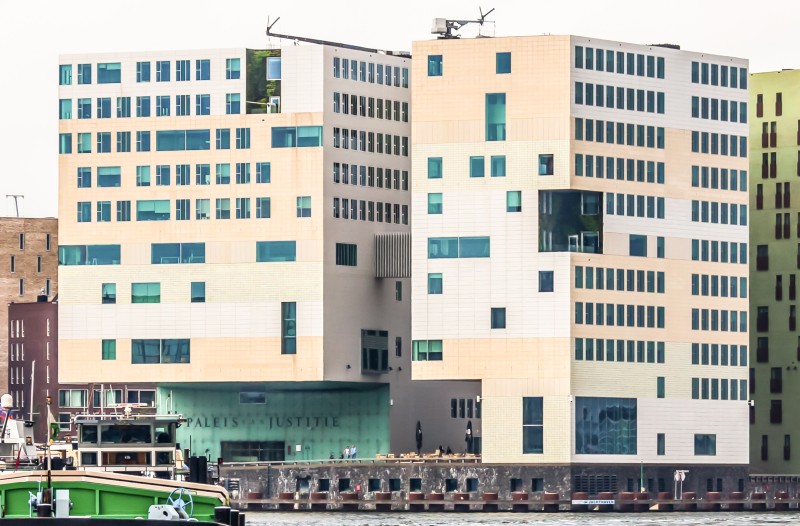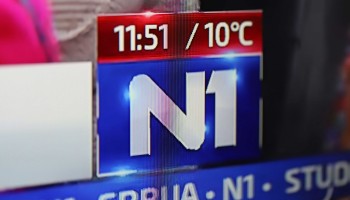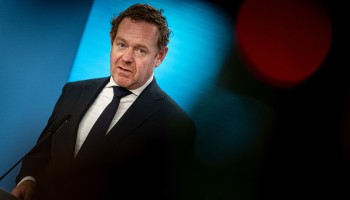In a marble-floored courtroom at the Palace of the Amsterdam Court of Appeal, a group of lawyers, businessmen, and judges gathered on Thursday to resolve a corporate dispute that many say could have far-reaching consequences for democracy nearly 1,500 kilometers away.
The case concerns accusations of a governance crisis within a company but at stake, some argue, is press freedom in Serbia. A ruling that could have helped determine the fate of the country’s last independent media outlets as they struggle to survive in what experts describe as an eroding democracy.
On the right side of the courtroom sat the defendants: lawyers representing United Group B.V., a Netherlands-registered company and its Luxembourg-based partners. On the left sat a smaller team supporting Dragan Šolak, the founder of United Group.
The case was filed after London-based BC Partners, the parent company of United Group B.V., dismissed United Group CEO Viktoria Boklag, replaced her with Stan Miller and removed Šolak from the company’s board in June. Šolak alleged a “serious governance crisis.”
The filing accused United Group of jeopardizing both the company’s interests and the editorial independence of outlets run by United Group’s media arm - United Media. United Group denied the allegations.
After hours of deliberation over the company’s complex ownership structure, the court ruled it lacked jurisdiction.
Judges in Amsterdam found that while United Group B.V. is incorporated in the Netherlands, its parent company is registered elsewhere. Lawyers for United Group B.V. argued that “the presence of one or more Dutch entities in the Group does not make Dutch law trump the shareholders’ agreement.”
The decision effectively halts an investigation into the abuse of power allegations, leaving Šolak’s team to seek remedies abroad.
United Media said in an email that it welcomed the court’s decision, adding that the case has never been a governance dispute but “another in a long line of distractions orchestrated by Mr. Šolak for his own ends.”
"United Group is functioning effectively under new leadership, with formal governance structures, a transitional executive committee, clear reporting lines, and oversight that were absent under Mr. Šolak’s leadership,” the Group said.
Šolak’s camp sharply criticized the outcome.
“We are extremely disappointed by today’s decision that the court does not have jurisdiction over the case, which allows BC Partners to avoid facing a proper investigation into their conduct — including their plans to undermine the last free media in Serbia,” a spokesperson for Šolak’s office told OCCRP after the hearing. “We are considering our options in other competent jurisdictions.”
Šolak’s lawyer, Jan Willem de Groot, said United Group and its parent company were “making every effort to avoid a substantive assessment of this case.” He called the ruling “a setback for independent media in Serbia,” noting that “if the Enterprise Chamber had ruled on the substance, it could have offered some protection. For technical reasons, that hasn’t been achieved today.”
De Groot said his team was exploring appeal options both in the Netherlands and in other jurisdictions.
United Media runs N1 and Nova — two of Serbia’s remaining independent broadcasters that have been providing a platform for opposition voices and live-streaming months of mass protests against corruption and authoritarianism, with demonstrators often clashing with riot police and pro-government groups.
Most Serbian media reflect the narrative of President Aleksandar Vučić’s government, portraying student protesters, journalists, and opposition activists as “terrorists” conspiring to destabilize the country.
Many fear that the new leadership of United Group is in cahoots with the government and that the editorial independence of N1 and Nova is under threat.
Their fears appeared to echo recent OCCRP and KRIK reporting, which revealed a leaked recording of a conversation between Miller and Vladimir Lučić, the head of state-owned Telekom Srbija. In the recording, Miller was heard saying he understood that President Vučić was angry because he had not yet dismissed the director of United Media.
“I cannot fire Alexandra today, as we discussed, okay? I need to make that company very small in Serbia, if you understand what I mean, and separate it,” Miller said in the recording.
After the hearing in Amsterdam, Miller told OCCRP that the conversation was taken out of context. “I have never interfered with anyone,” he said. “I am not involved in politics. I just did my job. And suddenly the whole internet is full of me being this kind of guy that wants to interfere with Serbia.”
Last week, Belgrade police raided the offices of a United Group affiliate after the company’s new director — appointed immediately after Miller took over — filed a criminal complaint accusing his predecessor of misconduct.
Serbia’s journalistic community viewed the move as the start of a government-backed takeover of N1 and Nova. The head of Serbia’s main journalism association NUNS Željko Bodrožić a raid of N1 could be expected next.
“We are talking here about an autocracy that is sliding toward dictatorship and our role models are countries like Russia and China where there is not free journalism,” he explained.
Outside the Amsterdam court, Miller appeared unfazed by the outcome. “The court processes — whatever. The courts are the courts. They must decide what is right and wrong,” he told OCCRP. “Am I happy or unhappy? It’s irrelevant. I’m here to do a job.”
This story has been updated with a statement from United Group






